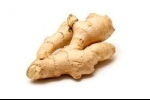
Dr. Richa Mittal
Ginger (the rhizome or root of Zingiber officinalis) is an herb that is commonly used in Asian cooking and has also been used in Chinese medicine for centuries. The phytochemicals in ginger have been studied for their effects on a wide range of processes in our bodies, including inflammation and cancer.
Here are some of the proven or possible health benefits based on studies from the last few years.
- Migraine headaches: In a double blind, randomized controlled trial of 100 people, ginger powder was found to be as effective as sumatriptan in treating migraine without aura and people also had less side effects.
- Post-operative and chemotherapy induced nausea and vomiting: Trials are ongoing and so far have been mixed as to whether ginger may help with nausea and vomiting after surgery and with chemotherapy.
- Pregnancy related nausea: In a review of studies, ginger was found to relieve nausea in pregnancy but there was no difference in amount of vomiting between ginger and placebo groups. If you are thinking about trying ginger for your pregnancy-related nausea, discuss with your doctor.
- Arthritis pain:Meta-analysis of small trials has shown ginger is moderately effective as safe treatment for osteoarthritis.
- Improvement in diabetes and blood sugar:A small randomized controlled trial comparing ginger (3 1 gram capsules a day taken for 8 weeks) compared to placebo showed improvement in fasting blood sugar as well as better insulin function.
- Anti-cancer activity against cancers of gastrointestinal tract:Experimental studies have shown that ginger and its active components including 6-gingerol and 6-shogaol have anti-cancer effects. Research is ongoing for GI as well as prostate cancer prevention.
- Menstrual cramps: A small, randomized controlled trial showed ginger (500 mg three times a day) given 2 days before menses and for first 3 days of menses was effective in reducing intensity and duration of pain compared to placebo.
- Decreased hunger: Although further studies are needed, preliminary studies show that ginger may increase feelings of fullness and decrease hunger.
- Improved cholesterol: In animal studies as well as studies on people on dialysis, ginger (1 gram daily for 10 weeks) showed improvement in triglycerides. Improvement in other forms of cholesterol has been mixed.
- Helps with indigestion: Ginger has been shown to help speed up gastric emptying in a small randomized controlled trial. The dose used was 1200 mg.
- Decreased brain inflammation in dementia:Animal studies have shown that the phytonutrient in ginger, 6-shogaol, may play a role in decreasing inflammation and reducing memory impairment in mice models of dementia. More research is ongoing.
Bottom line: If you are suffering from any of the above conditions, ginger could be a well worth and delicious addition to your diet!
The Content is not intended to be a substitute for professional medical advice, diagnosis, or treatment. Always seek the advice of your physician or other qualified health provider with any questions you may have regarding a medical condition.

